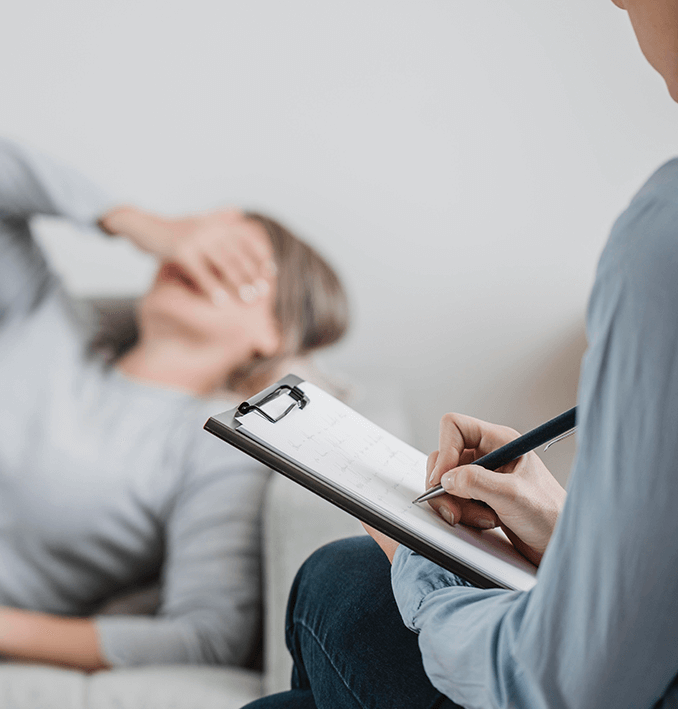Relationship OCD (ROCD) is a specific type of obsessive-compulsive disorder. People with this condition have disturbing and intrusive thoughts about their romantic partner, leading to behaviors aimed at seeking excessive reassurance. This can cause stress for both the person with ROCD and their partner and strain love relationships.
Navigating ROCD can be challenging. However, awareness of its symptoms, types, and treatments can make it possible to manage it. Read on to dive into a detailed overview of relationship OCD.
Ready to take the first step toward better mental health? Contact our experts via a video call.
What Is Relationship OCD?
People with relationship obsessive-compulsive disorder (ROCD) have stressful, intrusive thoughts about the “true nature” of their relationship. They show compulsive behaviors related to doubts or uncertainty regarding various aspects of their relationship.
ROCD is not formally listed in the Diagnostic and Statistical Manual of Mental Disorders (
Relationship OCD Symptoms
Some signs and symptoms of relationship OCD include:
- Excessive and irrational concerns about different aspects of relationships, such as whether or not your partner loves you.
- Constantly looking for reassurance from your partner.
- Distractibility and inability to concentrate due to intrusive thoughts about your relationship or partner.
Low sexual satisfaction[2] because of anxiety brought on by intrusive thoughts.- Frequently comparing your relationship with other people’s relationships.
Unlike rare concerns and comparisons that may happen in any relationship, obsessive thoughts about the partner and related compulsions are more serious. They can interfere with the patient’s daily activities and ability to function normally.
To diagnose ROCD, your healthcare provider will assess your symptoms and rule out other conditions, such as anxiety, depression, or related disorders.
ROCD Causes
There isn’t a definite cause for ROCD, but several factors can contribute to its development. Below are the possible ROCD triggers:
- Childhood trauma.
- Loss of a close relationship.
- Sudden changes in life and specifically relationships.
- Serious problems in past relationships.
- Preexisting OCD.
- A tendency to think negatively or tendency to dwell on worst-case scenarios.
- Fear of abandonment.
Note that relationship OCD can have different causes, and it’s recommended to consult a healthcare professional to identify them and get appropriate treatment.
Common Obsessions and Compulsions in ROCD
Obsessions in ROCD | Compulsions in ROCD |
|
|
Types of Relationship OCD
Relationship-focused
This type of ROCD makes individuals have
Partner-focused ROCD
In this type, individuals obsess over their
Relationship OCD vs Relationship Issues
It’s not uncommon to face challenges in relationships, so some people may find it difficult to distinguish between relationship OCD and typical relationship issues. However, if you have obsessive thoughts about the choice of partner or focus excessively on his/her flaws, and it disrupts your normal daily life, it’s advised to see a mental health professional.
However, if you feel constantly unhappy, incompatible, or unfulfilled, it isn’t necessarily ROCD but may be a sign that you need to speak with your partner about your relationships.
Is It ROCD, or Am I Not in Love?
ROCD involves obsessive thoughts and doubts about your feelings for your partner. You may constantly question whether you love them and if your relationship is correct. You might seek reassurance and feel intense anxiety about ending the relationship.
On the other hand, in typical relationship problems, you might experience conflicts, communication issues, or changes in feelings over time, but thinking about that doesn’t disrupt your life significantly for too long. Make sure you have open communication about these issues or see a counselor to better understand the situation.
Is It ROCD or Anxiety?
ROCD is a subtype of OCD that involves obsessive thoughts and compulsive acts related to your romantic or intimate relationships. This relationship anxiety is specific to your partnership and can lead to distress.
On the other hand, anxiety can affect various aspects of your life. If you’re experiencing overall anxiety that interferes with your relationship, it might not be ROCD but rather a broader anxiety issue.
Relationship OCD Treatment
ROCD is treated similarly to other types of obsessive-compulsive disorder. People with relationship OCD are encouraged to seek treatment from an OCD-specialized healthcare provider.
Learn more: Obsessive-compulsive disorder treatment strategies.
The following therapies are considered suitable for managing relationship OCD.
Exposure and Response Prevention Therapy (ERP)
Exposure and response prevention therapy helps patients to face settings that usually cause obsessions in a safe and controlled environment. This helps to learn how to deal with such urges and avoid compulsive behaviors. ERP promotes the understanding that intrusive thoughts come and go and you don’t have to take any action to get rid of them.
Each person’s exposure will be slightly different since the process
- Reducing anxiety about relationship-related triggers and helping to confront fears.
- Directly addressing and reevaluating irrational beliefs and doubts about relationships, promoting rational thinking.
- Enhancing communication and emotional intimacy by focusing on the present and reducing obsessive thoughts, leading to greater relationship satisfaction.
Acceptance and Commitment Therapy (ACT)
Through mindfulness and acceptance practices, ACT helps individuals acknowledge and accept their obsessive thoughts without judgment, reducing the distress associated with ROCD. Additionally, ACT assists in clarifying one’s values in relationships, enabling individuals to make more authentic choices that align with their core values, thus minimizing the impact of ROCD.
ACT also emphasizes committing to actions aligning with these values, empowering individuals to take positive steps in their relationships despite obsessive thoughts. Furthermore, it teaches techniques to distance oneself from distressing thoughts, increasing their control over emotional and behavioral response to triggers.
Couples Therapy
In some relationships, a partner without ROCD may unknowingly support their partner’s obsessions or compulsions. Couples therapy can help identify the triggers and provide insight into dealing with them healthily. It also encourages open communication. However, individual therapy may be also needed for a person with ROCD.
Mindfulness-Based Cognitive Therapy
Mindfulness techniques allow you to look at your anxiety in a different way. Rather than being consumed by tension or worry, you can observe your feelings and thoughts as distinct from your identity. You can practice mindfulness at any time and use various methods. One of them includes the following steps:
- Focus on bodily sensations like warmth, coolness, tingling, or pressure.
- Observe the natural rhythm of your breath without trying to control it. Notice how it flows through your body.
- Pay attention to the sounds around you, acknowledging that you can’t control what you hear.
- Be mindful of your thoughts and emotions. Instead of pushing them away, watch them as they come and go. Note where you feel each emotion in your body. Understand that you can’t control your thoughts or feelings. Let them pass like clouds in the sky and gently return your focus to bodily sensations, breath, and sounds.
Medication
In severe cases, a healthcare provider may prescribe medication to help alleviate OCD symptoms. Antidepressants (selective serotonin reuptake inhibitors (SSRIs)) are a type of medication that can be prescribed. The choice of the medication is made based on the detailed health assessment.
Coping Skills for ROCD
Obsessive-compulsive disorder and stress go hand in hand. A person with ROCD may use a number of ways to cope with stress, from meditation to improved sleep hygiene. However, not all of these strategies are equally effective for each person. Read on to learn more about the most common methods and try them to find out what may work best for you.
Fill Out The Communication Gap
Honest communication is the foundation of any relationship. Especially when your ROCD symptoms are intensifying, it’s important to fill out the communication gap. Your partner has to be aware of what you are going through. Unawareness of the difficulties you’re facing may lead to misunderstandings.
Attend Support Groups
Community support groups can provide an opportunity for people with ROCD to hear others who are dealing with feelings of isolation or embarrassment caused by ROCD. These groups have rules to protect the confidentiality of the members.
Distract Your Mind
Keeping yourself occupied will assist you in avoiding thoughts about your relationship. Furthermore, doing something enjoyable or creative may make you feel better about yourself. Take a new hobby, go out with your friends, or try something new. For example, you could try:
- Hiking
- Painting or drawing
- Reading your favorite book
- Visiting your favorite restaurant
- Playing your favorite game
- Watching your favorite movie
Give Yourself The Validation You Need
Seeking reassurance is natural when you’re feeling insecure. This, however, may put a lot of pressure on your partner if it happens too frequently. You need to hear from yourself that you’re a wonderful person. Telling yourself precisely what you want to hear is a good start. When you’re having doubts, list why you’re amazing and deserve love. If you’re struggling with self-esteem, tell yourself “I’m my kind of beautiful,” “I’m enough,” or “I’m a strong, intelligent person.”
Avoid Reading Your Partner’s Mind
Relationship OCD is mostly about intrusive thoughts that lead to wrong assumptions or misinterpretations. You may think, “My partner must believe this…” or, “I can tell they think I’m…”
The good news is that many of these thoughts are based on fears that are most likely irrational. If you tend to jump to conclusions, pause and ask yourself, “Is this based on reality?” “How do I know it’s true?” For example, if you are concerned that your partner has been distant for a few days, inquire what may have caused this distance. Is it relationship stress, work, family, or something else?
In Conclusion
Relationship OCD can be difficult to deal with, but support from your loved one and a mental health professional can be beneficial. Contact MEDvidi today to book an online appointment, get your symptoms assessed, and receive personalized recommendations and a treatment plan.








